| |
"Everyone to whom I talked as I embarked on the project told me the same thing; the task of sequelising Psycho, of re-creating a screen legend, was unassailable. That even if I made Citizen Kane the picture would be reviled and my career ended in one fell swoop (typically, when the picture succeeded, the very same people said we couldn't have missed – that with Tony and the Bates Motel and house, it was foolproof)." |
| |
Director Richard Franklin, from the Arrow booklet,
an extract from his unpublished autobiography |
OK. Cards on the table. Yes, I was shocked and startled and in awe of the shower scene in the original Psycho when I saw it at a repertory screening in the 80s. At the dawn of the VHS tape era, the idea of a member of the public being able to break a cut scene down to see how it worked was ludicrous. As a film professional and aficionado three decades on, I still applaud the sequence, revere it almost (though not too happy about the fact it's always referred to as Hitchcock's 'shower scene' with no mention of the man who actually made the cuts, George Tomasini. Hitch added two shots to Tomasini's first cut but then he did direct the lot of them despite noises off from Saul Bass). You're getting a strong sense of a 'but' here, right? Three things bugged me and bug me still about one of the most audacious (in context) sequences in film history. If you step into a shower, you do not stand there naked and open the faucet and let the water hit your body before testing the water temperature. Janet Leigh (bless her) stands in front of the showerhead and accepts the water, as is, with the merest twitch of a facial expression and gets on with the job at hand. To be fair, it was probably the forty-eighth time that day that she'd done the same action. Secondly, the murderer pulls back the shower curtain allowing Tomasini a relatively leisurely triptych of ever-closer cuts to Marion's screaming mouth (that's a 21st century editor talking) and then proceeds to slash downward, north to south.
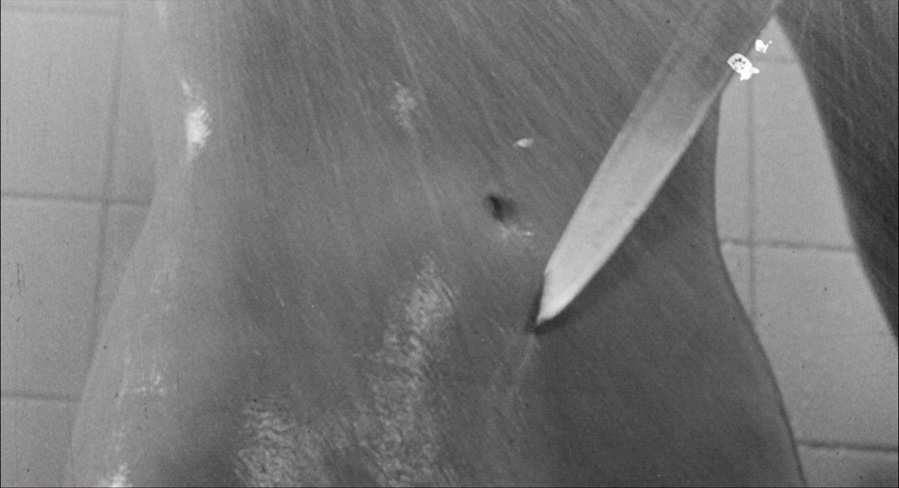
I know Hitch wasn't allowed to show blade penetration though there is a shot that sort of proves that he did. Leigh insists it's her torso with a retractable blade wielded by Hitch himself. But the north/south arc niggles. It's a silly thing to be bothered about but all that down thrusting seemed off. Yes, Marion was resisting the blade (who wouldn't?) but if you really take that scene apart cut by literal cut, you will see that despite its cinematic genius as a whole sequence, it doesn't stand up being unglued. But then editing doesn't stand up being taken apart in general. Thirdly, as I think Richard has mentioned in the Extras, there are significant continuity issues with the angle of the hand (mid shot to close up) that gropes for the shower curtain. No one cares and neither should I but I do because it's what I do. Richard says that the close up of the hand reveals an out of focus breast in the background. When challenged Hitch said something no director would get away with today. "That was the day we shot with a young boy..." Right. That's OK then! I am in no way criticising the astonishing effect of one of the most fêted sequences in film history, just pointing out a riff on that oft quoted story of human curiosity. If you want to see how a cat works, you take it apart and suddenly, it's not a working cat anymore. I still believe that it's the extraordinary shots and leisurely timing of them after the edit-blizzard which is just as worthy of attention. The Psycho shower sequence, like Giger's alien, has been subjected to so much rigorous scrutiny and attention that its lustre has inevitably faded. I need to acknowledge that to point out how high a mountain Richard Franklin and co. had to climb in making the sequel. How do you approach any kind of a sequel to Psycho knowing time had passed, time that had rendered the original as almost quaint or 'fairly tame' to the 80's eye as Richard notes in his memoirs? Richard and screenwriter Tom Holland started smart. They assumed the audience had seen the original and therefore knew what bright, bold buttons were there to be pushed. And they smartly manoeuvred around them. Echoes of the original are abundant but Psycho II is its own confident and bold beast.
Twenty-two years after the murderous events of the revered, classic original, Norman Bates is declared sane and is allowed to return home to his motel and gothic monstrosity of a house. Berated by his shower victim's sister at the courthouse, Norman cuts a nervous figure, which is exactly how he got into trouble in the first place. No more terrible stabs at knife puns. That ship has sailed. There's about an hour of them in some of the audio marketing. They drive you crazy after a while. We quickly establish that Norman may or may not be seeing or hearing things, a curtain twitch here, a disembodied voice there. His doctor wishes him well. He starts work at a local diner and meets Mary, a put upon waitress for whom he develops dare I say 'maternal' feelings. She ends up in one of Norman's motel rooms and the events of the next few days throw up tests for Norman's new found sanity. I'll not say any more because Psycho II's many considerable pleasures are plot turnings, set pieces, character revelations, sleights of editorial hand and deftly manoeuvring around those buttons I mentioned earlier. It is a masterful dance around the reputation of something beloved and revered and made hugely entertaining (and funny) by a man so steeped in Hitchcockian cinema, he could claim to be the man who knew just enough. No knife blade is left un-glinted, no crane shot unwarranted and there is no fat on the taut and muscular narrative.
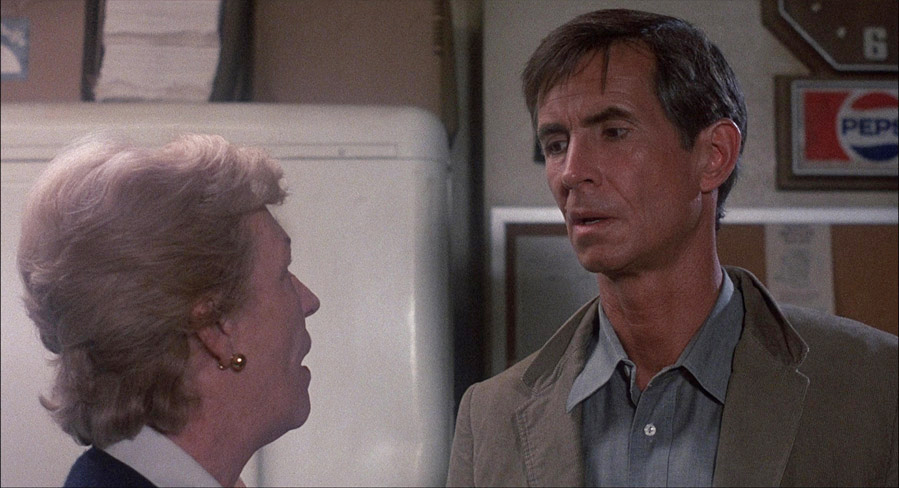
Anthony Perkins is excellent, taking Norman through the emotional wringer delivering a finely judged performance. We all know he's an ex-murderer who may or may not snap at any moment but he keeps us on our toes. Meg Tilly as Mary was a curious piece of casting. Jamie Leigh-Curtis was an obvious choice (daughter of the original shower victim Janet Leigh) but Richard, wisely despite having worked well with her on Road Games, went for an unknown. With no baggage, Tilly brings an attractive innocence to Mary and it's only because I know now that she'd not seen the original and had very little self confidence that I may be projecting here but she was the one part of Psycho II that didn't snugly fit as most of the other cast did. Again, maybe that's me. She's utterly believable in all the right places and that's the main thing. It's just a fey note she strikes with me as if a small percentage of her performance was tuned in to her own unease. In this instance, perhaps this would seem to work to the character's advantage. Vera Miles provides that anti-Norman link to the original and plays her scenes determinedly and (in one case) to the literal hilt. Stalwarts Robert Loggia as Norman's sympathetic doctor and Dennis Franz's sleazier than sleaze motel manager do a great job and are both utterly convincing.
Psycho II works so well because of the solid foundations of its superbly wrought screenplay. Tom Holland's work is first class but we also have to give Richard some credit in terms of shaping the narrative. Richard's direction and frequent misdirection are startling in their confidence aided and abetted by Andrew London, an old USC friend of Richard's who cut the movie with great precision. Psycho II simply feels Hitchcockian. Made just three years after the Master of Suspense's death, this seems quite a feat. Even Hitchcock himself didn't manage to live up to his own high standards with the last few pictures of his career. The world didn't creep past him, it thundered. There is a nagging sense that after being deified by François Truffaut and the Nouvelle Vague resulting in the hugely seminal Hitchcock Truffaut tome, Hitch went off the boil. This isn't to take anything away from his deservedly lofty status when he was firing on all cylinders. In the 40s to the 60s, no one did what he did as well. But great artists get older and the 70s presented Hitch with a society he no longer recognised.
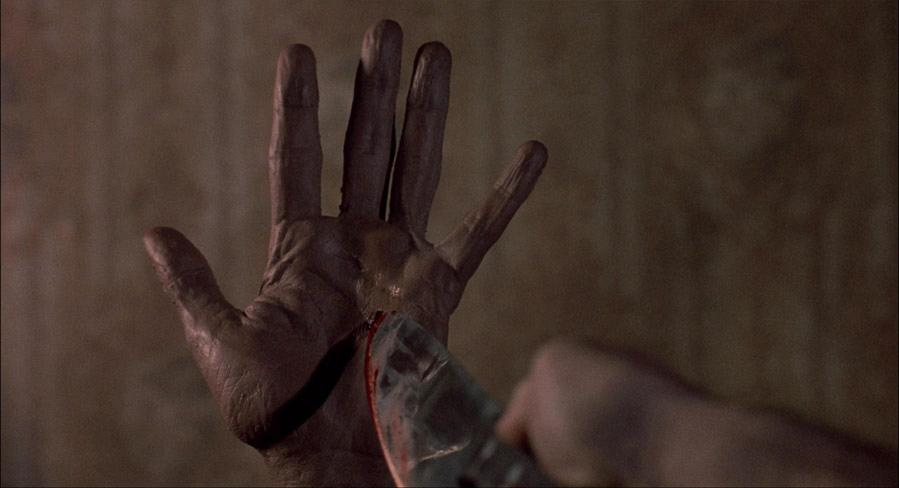
So what's to criticise? Psycho II is, as all things are, hostage to the era in which it was produced. Despite the talent of matte artist and visual effects master Albert Whitlock, film stock can often give away great artistry with a tiny flicker of a matte line. But age hasn't withered the effect of his work even though there may be just a sense that what you're looking at isn't quite real in some of the wider shots. What plonks the film squarely in 1983 is the prosthetics and they manage to take you out of the reality of the film, which is a shame considering the fact they all appear in moments of heightened tension. I can't ask him now (Richard died of cancer in 2007 at the absurdly young age of 59) but I'd love to know why a retractable knife, a real hand and a blood squirt wasn't employed for the close ups. The first hand's just about OK but the second one is wanting. I understand for the other big gore effect, you couldn't use anything but prosthetics but even though it's on screen for 8 frames and 10 frames respectively, the prop is again wanting. But again, I say that only from the sharp CG soaked eyes of the 21st century. At the time I remember going "Euw!" like everyone else. Jerry Goldsmith's score is a gentle, caring, romantic piece, which Anthony Perkins adored but the brilliant composer doesn't stint on the big, scary chords when required. It is as far from the strings-only score of Psycho's Bernard Herrmann as it could be but I suspect that was obviously intentional. One death, ironically free of prosthetics, is by far the most entertaining because of its shock value and one particular cut in the set piece which turns the death into a grim, comic event (as in laugh out loud rather than that fan assembly in San Diego every year). Hitchcock's cameo is present and correct though a shadow of his former self (sorry). Richard's own nod to this practice is in the diner as Norman enters. There's Richard, clad in favoured pastel pink shirt with a brief head turn to acknowledge Norman's arrival. I always smile at this cameo. I was his unofficial Mac tech guru at the UK end of a very vigorous and frequent email communication whenever he was back in Australia. I would have said he wouldn't have played video games at all but he claims he was something of a whizz at Battleground in one of the audio interviews.
Psycho II, as odd as it sounds, changed my life. Let me clarify. My own and my fellow audience members' reactions to the film steered me into wanting a conversation with the man who directed it and in a six month period a year later, I learned to endure the entire gamut of human emotion that is wildly unleashed while making a 'challenging' film. At a press show in 1983, the critical contingent (and myself, there as a purple suited Odeon usher with perks) broke into spontaneous applause at the final act of Norman Bates in the sequel to one of the most famous films ever made. I was well aware of Richard Franklin having seen and enjoyed both Patrick and Road Games. Rick McCallum (yes, George Lucas's producer on the Star Wars prequels) was producing challenging features at the time in London. While working as an assistant to the director on another Rick-produced movie, Dream Child, I learned that Richard was over at Thorn EMI at Shepperton Studios to pitch a feature. Once Rick had told me Richard was in the next room, I remember demanding an audience. Forgive me if the historical details have been somewhat hazily recalled but I do remember being insistent that I should say hullo. I've met many heroes of mine (Jerry Goldsmith, David Lean, Steven Spielberg, Douglas Adams and Michael Powell) and none had feet anything even resembling clay. Richard was a hero of mine who became my boss, mentor and close friend more or less in that order. In 1985, Richard was 'hot' as Psycho II had made serious money. At Thorn EMI, Verity Lambert (Doctor Who's very first champion) was enthusiastic to support talent and she saw something in Everett de Roche's idiosyncratic screenplay of Link or realised that being in a metaphorical bed with one of Australia's (and Hollywood's) leading directorial lights was a good move. Green lit, the production of the film Link became my baptism of hell fire. This is not the place to regale you with the scoop on Link. But... As I said. Not the place.
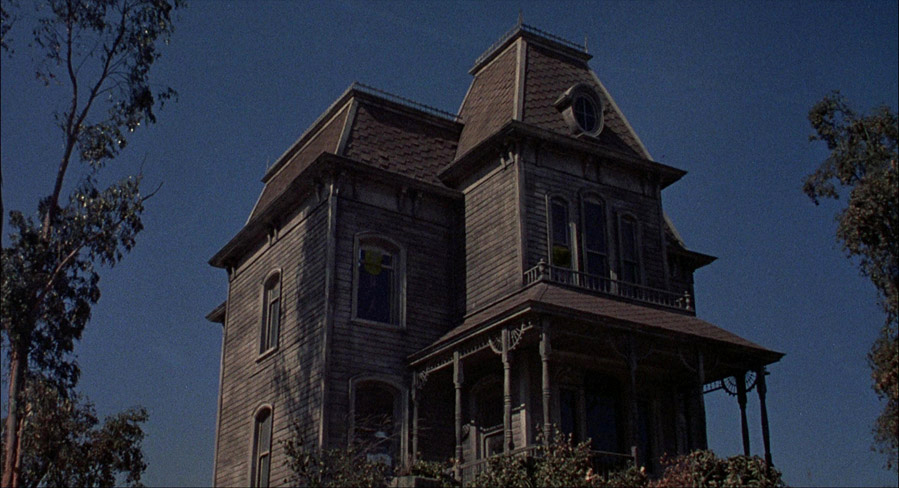
Psycho II is all these things; a finely crafted thriller, a restrained but effective horror piece, a suspense masterclass and an example of something Hollywood rarely offers up with any great humility, a respect for the artists who came before. Due to a great script and meticulous craft, Richard managed to have his cake and eat it whole (only because Norman refused to slice it for him). 'Caaaa-utlery,' not his thing.
The 1.85:1 aspect ratio presentation looks good with a grain and softness typical of the film stocks of that era. The contrast is punchy and the shadows rendered very well. Of course, this is Psycho II – black needs to be well represented in frame at all times. There was no damage that I could see, a little grain maybe and the disc copy – remastered from a 35mm interpositive – looks really impressive.
There are four audio options, the original stereo mix, a 5.1 mix (favoured I have to say even though not too much for the sub to do but the rears were nicely integrated particularly at heightened dramatic moments) and the other two are talk tracks. One is the first Extra, screenwriter Tom Holland's commentary and the second is a real curio. Called 'Promotional' Record, it's the audio from a vinyl LP which features all the audio marketing for the movie.
There are optional English subtitles for the deaf and hard of hearing,
Audio commentary with writer Tom Holland
Rob Galluzzo, director of The Psycho Legacy documentary leads screenwriter Tom Holland through the film with scene specific commentary and a few pauses to fact check online as the men talk. Holland is very interesting, extremely enthusiastic and regards his time on the film (as actor and screenwriter) as almost perfectly positive. Note for completists, Holland is cast in the film as the deputy. Twenty-eight minutes in, Tom Holland mentions a personal tour of the Universal Lot with Richard, seeing the original Phantom of the Opera sets (from the silent era). It stopped me in my tracks. In early 1990, Richard took me on the same personal tour. Ah, I miss him. Tom remarks on what a great team Andrew (editor) and Richard were, having developed a friendship at USC. Anthony Perkins is noted as a very intelligent man and his connection with Broadway composer/lyricist Stephen Sondheim is given as evidence of this. This is a loving and detailed commentary and the only negative scuttlebutt was left for the professional relationship between Meg Tilly who had no idea who Tony was, and Tony who demanded Richard replace her! Success smooths a lot of ruffled feathers, does it not? I have a list of lovely details in front of me but you know what, I'm going to let you find them out. One on the list is worth repeating. At the opening of the original, Hitchcock garnered possibly the worst reviews of his career...
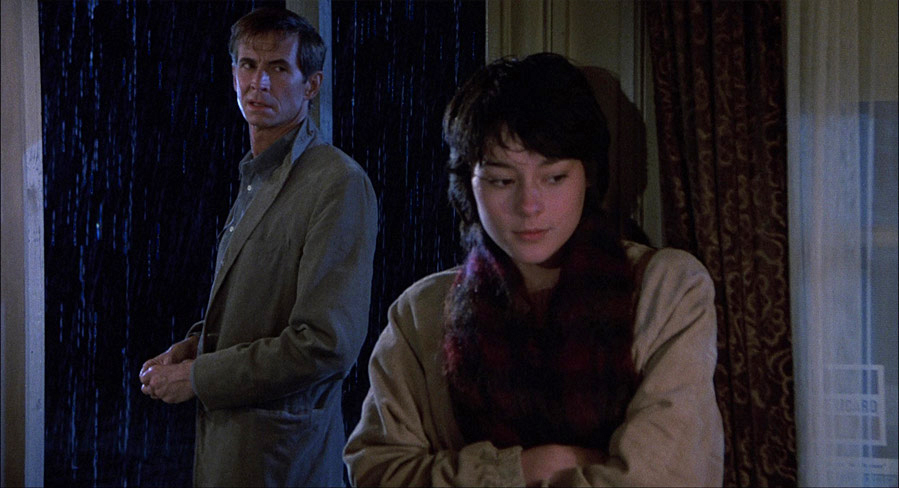
Behind the Curtain: Masters of Horror on 'Psycho' (43' 17")
Director of the documentary, The Psycho Legacy, Robert Galluzzo joins Screenwriter Tom Holland, and the director of Psycho IV, Mick Garris. The three men go in chronological order with some repetition from Holland's commentary (accepted given the questions). They cover their introduction to Psycho, their following Hitchcock's career from The Birds. You have to remember that Hitchcock was a hugely famous figure on American TV at the time. Garris suddenly realised he was also a great movie director. The usual suspects come up; writers Robert Bloch, Joseph Stefano and serial killer Ed Gein. Holland talks about how he and Richard snared Perkins (without whom the movie was destined for cable TV). Holland is forthright about Perkins' problems with Meg Tilly. And what would a cinematic landscape be like without Psycho? Nice camaraderie between the three, a lovely extra.
Giving Bloch His Due (9' 11")
A chat with author Chet Williamson. Williamson was commissioned to write a sequel to Robert Bloch's original novel despite the fact that the author had done just that but Hollywood hated it and went with Richard and Tom Hollander's ideas for the movie. Williamson takes us through Bloch's career (of the three original scripts for the original Star Trek, I was very affected by What Are Little Girls Made Of) and it's an up and down ride career-wise but despite being the creator of Norman, Bloch had a few critical punches undeflected.
TV Interview with star Anthony Perkins (7' 38")
Ivan Hutchinson, Australian film reviewer, interviews Perkins at the release of Psycho II in Melbourne. He talks about a rather nasty accident on the beaches of, uh... On The Beach. Perkins restates his Norman credentials and talks about Richard's take on the sequel. He's also politically nice about Meg Tilly (there were some tensions between the two according to Holland) and rounds off the interview after Hutchinson says "It's nice to know you're not like Norman," to which Perkins replies "Well, that's for you to say..." Nice.
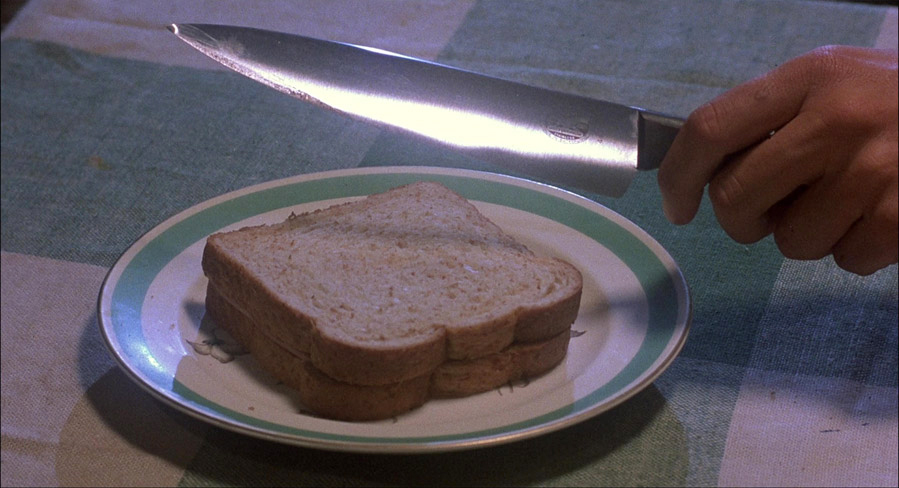
Anthony Perkins Audio Interview (2' 21")
This is a more up to date interview (although as he died in 1990 it couldn't have been too long after Psycho II came out). It solidifies Perkins' interest in story over all other aspects, like standard horror ingredients. He underlines the film's discrete nature and has the interesting insight that the films are fair and that the audience has been treated honourably. This interview seems like a cut and paste job from four or five interviews (or two intercut).
Richard Franklin Audio Interview (19' 59")
With some lovely stills to accompany it (the first Polaroid made me grin), Richard is interviewed presumably in front of students or an appreciative audience. There's a lot of repetition with the memoir in the booklet (how could there not be?) I'm reminded of a begrudging Harrison Ford doing a publicity interview for Raiders of the Lost Ark and clearly tired with the endless repetition, he told ITV's Clapperboard children's film show, "It's about having sex with camels." I wonder why I remember that? Richard's Brian DePalma story is a priceless tale of an actor's ego rampant. Richard talks about how he was not invited to marketing meetings after blatantly showing up someone's first idea (a direct steal from the original movie). There are hiss levels rising as we try to make out the questions but this aspect doesn't detract.
Richard Franklin On Set (1' 54")
A short, sweet, personalised tour of the Psycho house and interior façade with Richard doing his Attenborough routine. Intercut with a lot of shots from the film, this is a curio as it seems to be the intro to something much longer and cuts off almost mid sentence.
Richard Franklin Scene Commentary (5' 34")
How I would have loved to have had a full commentary from Richard. My DVDs are in storage after a move so I can't confirm he ever did one for the DVD release (I know he did one on Patrick and pretty sure Road Games too) but Google is giving me grief turning up all sorts of commentaries on the film but mostly by fans. This intriguing little scene commentary is obviously delivered to an audience. Richard starts with the story of the initial quote above. He then says something telling, a small mistake but a Hitchcockian one, suitably macabre... He says he shot the 'dead' character in slow motion so that "we wouldn't notice he wasn't breathing..." (my italics). As far as I'm aware the actor was still with us until 2015... It's lovely to hear Richard in tutor mode. I spent an entire day with him in London explaining exactly how all the effects work was achieved in The Birds... He was so good at that stuff.
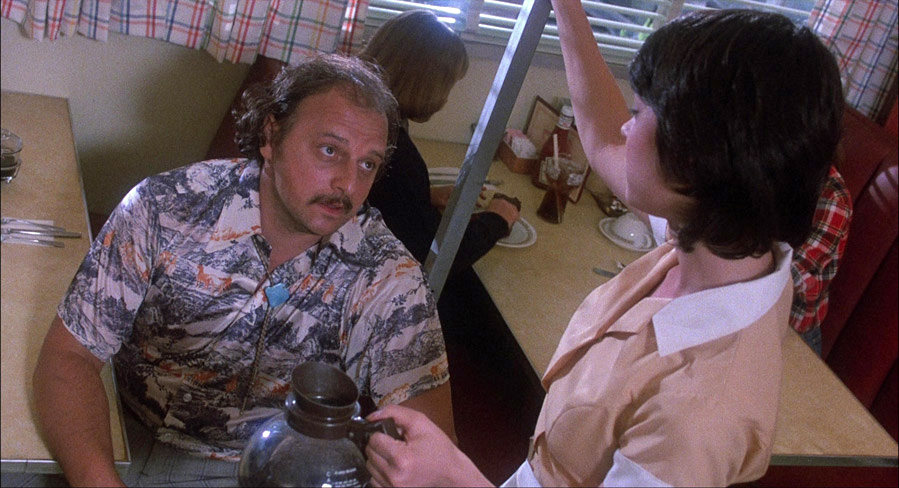
Vintage Featurettes:
A Sequel to a Classic (5' 58")
With Hitchcock movie clips and Hitch on a camera crane bringing us into the mood, we cover the making of the sequel with interviews from all of the behind the scenes main players and actors, Vera Miles and Anthony Perkins. The Janet Leigh interview at the start ends with her talking about being nervous having showers... (in an affected southern accent) "because I'm scayered!" and the giggle that follows is just exquisite. I had a thing for Janet Leigh.
The House on the Hill (2' 06")
A brief summation of the importance of both Hitchcock to Universal as well as the physical legacy of the Psycho house, a giant prop in essence which visitors flock to see.
Personality Profile; Anthony Perkins (1' 56")
With clips from earlier work, this is a basic studio profile of a versatile and talented actor who was lucky and unlucky enough to be typecast as an innocent looking nutball. His interview on set finds him quite happy with his singular part.
Personality Profile; Richard Franklin (2' 05")
This starts with Richard's story about seeing the film with a friend at 12 years of age. He says "The sight of Janet Leigh in her bra was even more startling than the fact she was disposed of in a shower." That says a lot about Richard but perhaps not so much his 12-year-old self. But then what do I know?! Richard, on the steps of the set, gives us all the personal info, most of which has been remarked upon in other sources on other extras. Again an inevitability but not an unwelcome one.
Still Crazy After All these Years (6' 44")
An introduction and commentary over the bespoke Hitchcock trailer as well as a repeat of the Janet Leigh shower interview (but I could watch that giggle and quote many times). The same footage and commentary follows on as a repeat of the A Sequel of a Classic (above) and sections from other extras above.
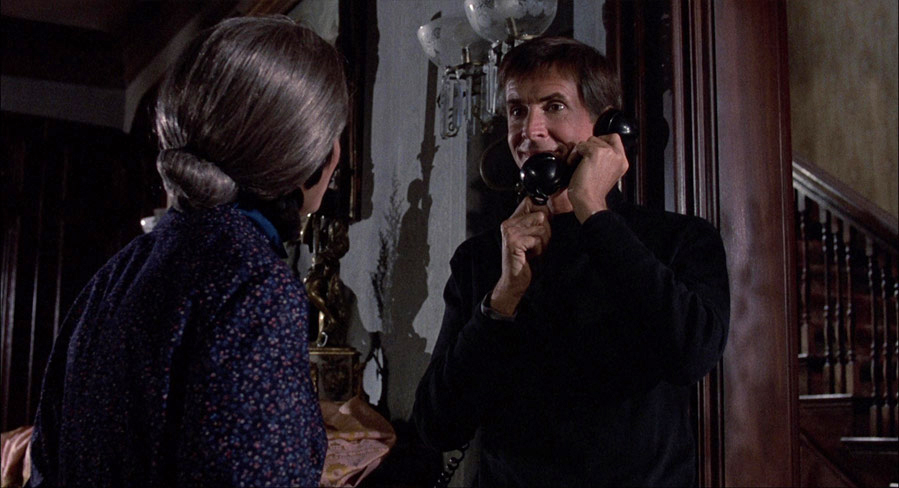
Behind The Scenes (1' 44")
Richard directs in the bloody bathroom set and there follows without commentary, 'B' roll of Richard at work. It's quite refreshing without all the publicity commentary all over it. But it's very short.
Anthony Perkins Interview (1' 22")
Not so much an interview as a single question – will the sequel play well in colour? Perkins comes up with the idea of 'Black and colour', which is pretty accurate.
Vera Miles Interview (1' 26")
Miles talks about working with and getting to know Anthony Perkins and seems surprised calling the first film Psycho I – Richard would have been thrilled.
Janet Leigh Interview (1' 34")
Again, a single answered question but it's a good one. Hitchcock hired actors but to only actually direct them if their slice of the whole 'pie' got larger or smaller than intended. So satisfaction, you assume, is when Hitch says "Next set up!"
Jerry Goldsmith Demo
In the mid-80s, Jerry was well into his experimental synth period. This is an electronic version of the soon to be fully orchestrated theme.
Trailers & TV Spots:
Trailer 1 (Teaser) (1' 19")
The first trailer is essentially the shower scene from the original, a nice B&W to colour transition of the hotel sign and a single moody shot of Norman and the house. The tag line is suitably intoned. There's a cheesy computer graphic of a zoom into a cinema and the word 'Summer' which presumably was on the end of the teaser.
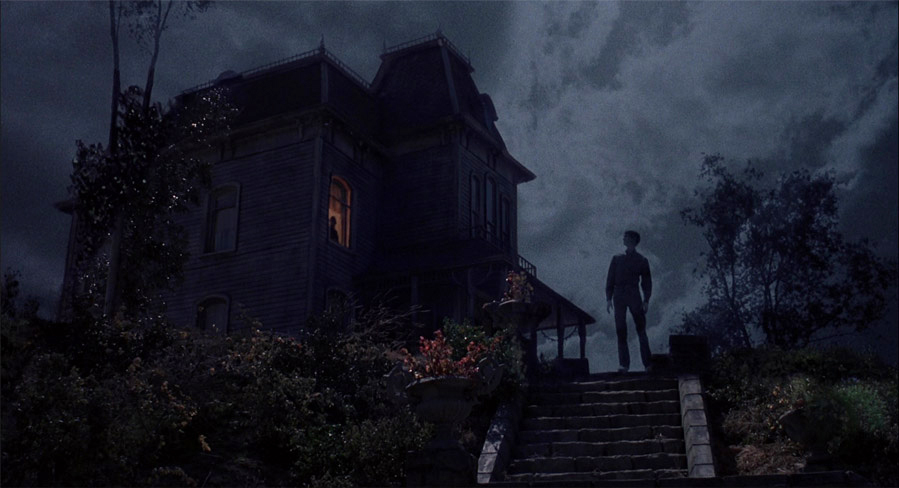
Trailer 2 (2' 11")
A standard 80s trailer but very nicely put together with sparse use of voice over.
TV Spots 1-4
All are approximately 30" each and feature material from both of the trailers differently presented with same five seconds at the tail of title and credits.
Image Gallery
The gallery consists of 15 B&W movie stills and one behind the scenes. There are a further 8 Colour Front-of House stills, another black and white behind the scenes still. Next comes the poster art, 10 colour stills, 1 Polaroid and one behind the scenes cutting the Psycho house cake (black and white). At the close there's one small picture of promo art.
Promotional Record
This is a new one on me! I can't tell if the 'record' was a 45rpm or 33 (younger readers, stop sighing. You use vinyl too, now). This features an intro to lots of audio featurettes delivered to radio stations around the US via record. The intro is written on full knife pun-mode. The first features Perkins front and centre, the second Richard Franklin on the technical challenge. The third has Hitchcock archive and Richard talking about how Hitch had bamboozled the censors by claiming the out of focus 'breast' in the background of a shot in the shower scene was that of a young boy used as a stand in... They bought it. In number four, Anthony Perkins talks about how he got the original role. Number five, frontlines those on the original who joined Richard for the sequel. Perkins describes 'coming home...' Number six starts with Ennio Morricone's score for The Thing... Carpenter's movie is never mentioned. Hitchcock explains the 'bomb' story illustrating suspense. Number seven gives us Hitch archive, specifically the 'cattle' remark. Janet Leigh justifies the remark as Vera Miles pushes Hitch as a splendid character actor. Perkins reveals Hitch's food preferences and one extraordinary act of food generosity.
Number eight is a re-edit of number five. It features producer Hilton Green talking about the reconstruction of the house. Richard chips in with what they could use from the original and what happened to the original Psycho showerhead. Number nine pushes typecasting to the fore. Perkins talks about his acceptance of being Norman. Number ten (there's The Thing cue again) has Richard acknowledging the huge debt owed to Hitchcock. Hilton Green recalls déjà vu while Vera Miles attests to the quality of Richard's sequel. Number eleven riffs off Hitchcock's original trailer for Psycho with Hitch himself introducing it... "The blood!" The bomb as suspense story is repeated as is the lamb joint as murder weapon story. And the cattle story. In number twelve there is some repetition of Perkins describing his role in the sequel. Repetition abounds by number twelve. Then there are what's known as 'open ended cuts...' (1) Actors on their roles, (2) Hitchcock and Richard compared, (3) Shower scene debate, (4) Perkins on the original, (5) Perkins on Psycho II, (6) Hitch on suspense, (7) Hitch on the cattle remark, (8) Remaining faithful to the original, (9) Perkins and Bates together again and finally (10) Psychic phenomena on the set of II. Wait, there's more.
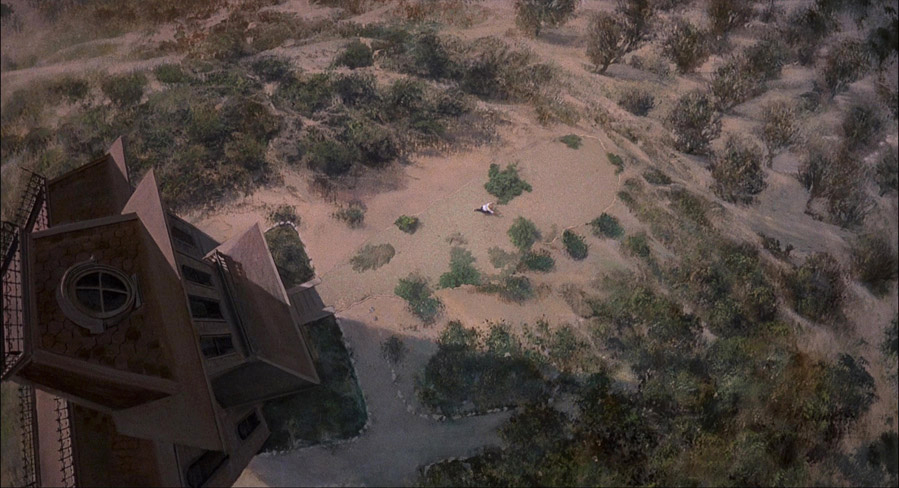
Promo No. 1, talking about the sequel, Promo 2 – more repetitious PR fluff. Now audio only film clips... No. 1 – shower scene, No. 2 – "Mother, oh God!" No.3 - Restored to sanity. No. 4 - Bates offers a place to stay. No. 5 - Doctor and Norman re-meet. No. 6 - Sherriff Hunt. No. 7 - Mrs. Loomis "What alibi?" No. 8 - "My mother's downstairs..." No. 9 - Norman talks to his mother. Music clip 1 – is that Jerry? 2. Jerry's Main theme 3. Hermann's On the Road cue, 4. Shower stabbing, 5. A Jerry cue, not sure which Maybe It's Not Your Mother, last cue on Side A of the original album. 6. One note. 7. Open ended 15 minute interview with Hitchcock recorded in 1960 and finally a six and a half minute audio trailer for Psycho.
Reversible sleeve featuring original and newly commissioned artwork by Adam Rabalais
Not available for review. But if it's the booklet's cover, it's brilliant!
Collector's Booklet with new writing on the film alongside a reprint of the 'Psycho II' chapter from Richard Franklin's unpublished autobiography
This was also not available with the review disc but I pulled a long distance string (thanks Jennifer) and obtained one and it's a cracker. I love the new cover art with the Psycho house as the shape of the key's teeth. The essay on the film by Jon Robertson is terrific with many insights into the film I'd not considered but the cream of the booklet is Richard's objective slice of autobiography written shortly after the film was made (so still fresh). It has the beautiful title of Without A Hitch. He was writing up each film as his career progressed and his personality comes off the page in waves. His memoir is also entertaining in its own right and he was an intelligent and thoughtful individual who was mystified by the frankly ridiculous habits of Hollywood execs and the like and there are lots of those stories in his piece too. He used to entertain me with some of these stories and finally those people blithely closed down his Hollywood career and he continued his filmmaking in his native land.
Finally, a contradiction...
If you're reading, Andrew (Andrew London, Editor), this disc has some people crediting you for the poster image (no argument) but in Richard's memoir, he claims the authorship of the tag line snuck into a publicity department's in-tray. But Holland and co. tell us it was you... Go on, you both suggested it simultaneously, right?
Well, it's perhaps too personal for me to be objective but Richard announced his directing presence in Hollywood with some authority on Psycho II and has fashioned a tremendously affecting, entertaining and surprisingly funny film that Hitch himself would have appreciated. It's dated slightly but great stories don't date so have a night in with a few beers and let Norman do his thing. Highly recommended.
|